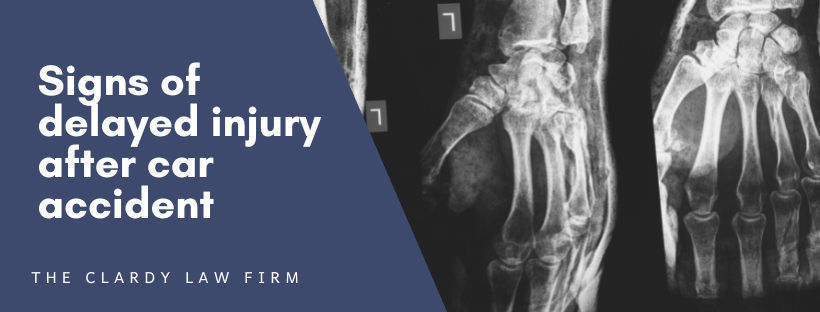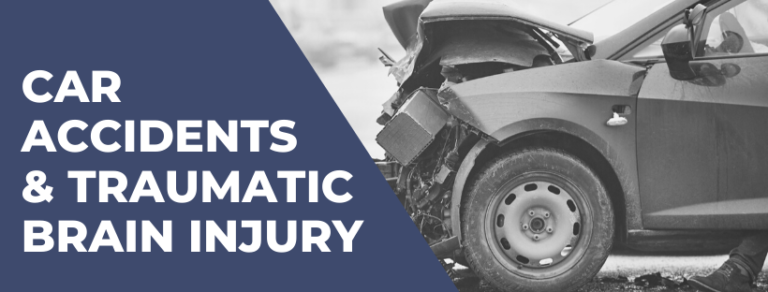Car accidents cause thousands of injuries in the U.S. every year. But not all result in obvious or immediately excruciating pain — some injuries take days, weeks, or even months to fully manifest.
While you can initially feel fine after a car wreck, you might later develop a headache that won’t go away, or your head, neck, and shoulders might stiffen and throb with pain.
Delayed injury is a serious matter, but why can pain be delayed after a car accident, and what signs should you look out for?
What Causes Delayed Injury?
The moments following any car accident are a rush of adrenaline and endorphins. The body releases stress hormones to help you survive dangerous situations. But while these chemicals are useful for coping emotionally, they can dull or even completely mask physical pain. While it often takes just a few hours for the inflammatory response — when damaged tissue begins to swell — to kick in, it’s not uncommon for symptoms to stay hidden for longer.
This can be particularly dangerous. Just because your pain after a car accident is delayed does not mean it’s not a sign of a serious condition. Internal bleeding can be life-threatening, but it may take time before you start experiencing symptoms. Likewise, you can have whiplash or a traumatic brain injury and not experience stiffness, light sensitivity, memory problems, or headaches until days later.
What Are the Most Common Delayed Injuries?
Many car accident injuries can be delayed, but some of the most common are:
- Whiplash and other neck or back injuries
- Spinal cord injuries
- Traumatic brain injuries
- Sprains
- Post-traumatic stress disorder (PTSD).
But what symptoms should you look out for? The signs of delayed injury can vary depending on their cause but typically include the following.
Headache
Headaches are so common that if you have one days or weeks after an accident, you might not think it’s related to your crash. But headaches can indicate several conditions, including a neck or traumatic brain injury.
Traumatic brain injuries can range from mild (concussion) to severe (a blood clot or bleeding on the brain), but even a concussion is serious. That’s why you must see a doctor if you have a headache after a car accident. Sometimes, a headache is just a headache, but it could also signify delayed injury.
Tingling or Numbness
Tingling and numbness often indicate nerve injury. The exact injury will depend on where you experience these symptoms. Tingling arms is a common delayed sign of whiplash, while numbness or pins and needles in the spine can signify a spinal injury, such as a herniated disc or pinched nerve.
Cognitive and Speech Impairment
Cognitive and speech impairment are among the most noticeable and severe signs of delayed injury after a car accident. If you have trouble with your memory or concentration or find it difficult to communicate or understand others, you might have a traumatic brain injury.
Dysarthria (slurred speech and difficulty articulating thoughts) and aphasia (trouble comprehending what others are saying) can be life-changing, requiring you to develop new ways of communicating with others. Understandably, it can also have a huge emotional burden, affecting your confidence and causing you to become withdrawn.
Delayed Neck Pain and Stiffness
Pain or stiffness in the neck is one of the most common symptoms of whiplash. This often happens in rear-end car crashes when the neck snaps back and forth and strains the ligaments and muscles.
Whiplash is common after a car accident, but that doesn’t mean you should dismiss it as a minor injury. Left untreated, whiplash can cause severe and persistent pain, problems with concentration, ringing in the ears, irritability, and poor sleep.
Back and Shoulder Pain
Lower back pain, whether mild or severe, can indicate an injury to the ligaments and muscles that support the back. These can range from a ruptured disk to a spinal cord fracture.
If you have delayed pain in the upper back or shoulders, your first instinct may be whiplash, but it can also indicate a slipped disc, soft tissue damage, or a severe fracture.
Pain or Bloating
A swollen abdomen and delayed pain after a car accident can indicate an internal injury, especially if you also experience dizziness or fainting. Internal injuries are incredibly dangerous and can become fatal if left untreated.
Anxiety and Changes in Mood
Feeling anxious, having nightmares, and experiencing irritability or rapid changes in your mood can indicate post-traumatic stress disorder. PTSD can happen after any traumatic event, including a car accident, and can be extremely debilitating. PTSD is diagnosed when a victim experiences symptoms for at least a month following the traumatic event, but it doesn’t always happen immediately. Delayed-onset PTSD occurs when you experience symptoms after six months or longer.
What to Do If You Suffer Delayed Injury after an Accident
When you’re in a car accident, the potential for serious injury is real, even if you feel okay at the time. The longer your injuries are left untreated, the greater the chance of a lengthy and more complicated recovery. But you may not realize your condition is worse than you initially thought at the time of your accident, and you might wonder if there’s anything you can do or if it’s too late.
The first thing to remember is that when your delayed injury starts showing symptoms, don’t explain them away as unrelated. Aside from your health, there’s another crucial reason for seeking medical attention as soon as possible: you might be entitled to file a personal injury claim.
If your accident wasn’t your fault, you could recover the cost of your medical expenses, lost wages, and other damages from the at-fault party’s insurance company. But the longer you wait to diagnose your symptoms, the harder it is to prove your injuries happened during the car accident.
That’s why it’s recommended to seek medical attention immediately after your accident, even if you feel fine. Then, if your pain is delayed, you have the initial record from your doctor, who can link your symptoms to your car accident.
It can also be beneficial to speak to a personal injury lawyer. They will assess your case and determine if you have a claim. If you’re concerned about paying for your medical bills, they can also arrange for payment to come out of your settlement, which can alleviate the financial burden of your crash.




